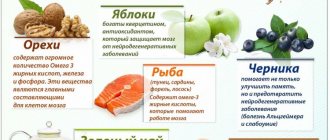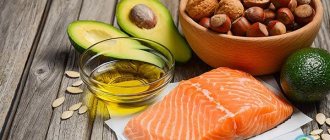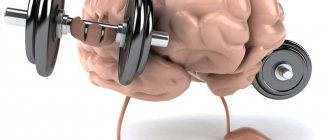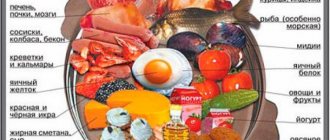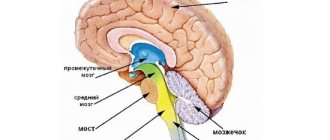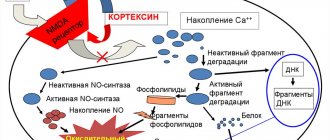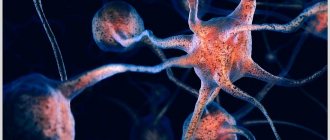Nuts and seeds
Everyone knows that to speed up the work of the mental organ, you need to eat walnuts. These nuts contain zinc, potassium, calcium, magnesium, iron and phosphorus. It is these substances that make up the human brain. This is why they are so good to eat. They also contain various vitamins that speed up the process of brain activity.
Brazil nuts contain a large amount of selenium, which has a beneficial effect on the thinking organ. This is the fattest nut.
Pumpkin seeds and sunflower seeds contain zinc, acids, vitamins A and B. All this reduces body fatigue.
The daily portion for the brain, which has a beneficial effect on activity, is thirty to fifty grams.
to contents ^
Products for the brain and memory
Fatty fish
Fatty fish are a good source of omega-3 fatty acids, which help form the membrane around every cell in the body, including brain cells. Therefore, they can improve the structure of brain cells called neurons
. Research shows that people with high levels of omega-3 have increased blood flow in the brain. Scientists have also identified a link between omega-3 levels and improved cognitive function. These results suggest that eating foods rich in omega-3s, such as fatty fish, may stimulate brain function.
Examples of fatty fish containing high amounts of omega-3s include:
- salmon;
- mackerel;
- tuna;
- herring;
- sardines.
People can also get omega-3s from soybeans, nuts, flaxseeds and other seeds.
Dark chocolate
Dark chocolate contains cocoa, which contains flavonoids, a type of antioxidant. Antioxidants are especially important for brain health, as the brain is very sensitive to oxidative stress, which contributes to age-related cognitive decline and neurodegenerative diseases. Cocoa flavonoids are beneficial for the brain, helping to stimulate the growth of neurons and blood vessels in areas of the brain involved in memory and learning. They, like omega-3, are involved in stimulating blood flow in the brain. Research confirms the stimulating effect of dark chocolate. Scientists used imaging techniques to study brain activity after participants ate 70% chocolate. Scientists have concluded that eating dark chocolate can improve brain plasticity, which is very important for learning.
Berries
Like dark chocolate, many berries contain flavonoid antioxidants. Research shows that berries are good brain food. Antioxidants in berries include anthocyanin, caffeic acid, catechin and quercetin. Antioxidant compounds in berries have beneficial effects on the brain, including:
- improve communication between brain cells;
- reduce inflammation throughout the body;
- increase plasticity, which helps brain cells form new connections, stimulating learning and memory;
- reduce or delay age-related neurodegenerative diseases.
Berries Rich in Antioxidants and Promoting Brain Health:
- strawberry;
- blackberry;
- currant;
- mulberry;
Nuts and seeds
Eating more nuts and seeds may be good for your brain, as these foods contain omega-3 fatty acids and antioxidants. Study results show that nut consumption is associated with improved brain function in later life. Nuts and seeds are also rich sources of the antioxidant vitamin E, which protects cells from oxidative stress caused by free radicals. As a person ages, their brain may be subject to this form of oxidative stress, which is why vitamin E may support brain health in old age. Vitamin E also helps improve cognitive function and reduce the risk of Alzheimer's disease.
Nuts and seeds high in vitamin E:
- sunflower seeds;
- almond;
- hazelnut.
Whole grains
Eating whole grains is another way to benefit from the benefits of vitamin E, as grains are a good source of the vitamin.
Coffee
Coffee is a well-known concentration aid. Many people drink it to stay awake and improve alertness. The caffeine in coffee blocks a substance in the brain called adenosine.
, which causes drowsiness. Researchers have found that caffeine increases brain entropy, which refers to the complex and variable activity of the brain. When entropy is high, the brain can process more information. Coffee is also a source of antioxidants, which can support brain health as people get older.
Avocado
Eating monounsaturated fats lowers blood pressure, and high blood pressure is known to be associated with poorer cognitive function. Thus, the unsaturated fats in avocados may reduce the risk of cognitive decline.
Other sources of healthy unsaturated fats:
- almonds, cashews and peanuts;
- flax and chia seeds;
- soybean, sunflower and rapeseed oils;
- walnuts and Brazil nuts;
- fish.
Peanut
Peanuts contain a lot of unsaturated fats and proteins and support a person's energy throughout the day. Peanuts also provide key vitamins and minerals to support brain health, including high levels of vitamin E and resveratrol. Resveratrol
is a natural non-flavonoid antioxidant found in peanuts, mulberries and rhubarb. Resveratrol has protective effects, such as helping to prevent cancer, inflammation and neurological diseases, including Alzheimer's and Parkinson's disease.
Eggs
Eggs, which many people enjoy for breakfast, can be an effective brain food. They are a good source of the following B vitamins:
- vitamin B6;
- vitamin B12.
Recent research suggests that these vitamins may slow cognitive decline.
Broccoli
Broccoli and other cruciferous vegetables are rich in fiber and nutrients. Besides being a low-calorie source of dietary fiber, broccoli is good for the brain. Broccoli is rich in compounds called glucosinolates. When the body breaks them down, they produce isothiocyanates. Isothiocyanates reduce oxidative stress and the risk of neurodegenerative diseases. Broccoli also contains vitamin C and flavonoids, and these antioxidants can further boost a person's brain health. Other cruciferous vegetables that contain glucosinolates:
- Brussels sprouts;
- cauliflower;
- turnip.
Cabbage
Leafy greens, including kale, may support brain health. Like broccoli, cabbage contains glucosinolates
, as well as other key antioxidants, vitamins and minerals.
This is why many consider kale a superfood
.
Soy products
Soy products are rich in a specific group of antioxidants called polyphenols. Scientists have linked polyphenols to a reduced risk of dementia and improved cognitive abilities with aging. Soy products contain polyphenols called isoflavones, including daidzein and genistein. These chemicals act as antioxidants, providing a range of health benefits throughout the body.
Gifts from the sea
It has been scientifically proven that the brain consists of many neurons. If the amount of cholesterol in the body goes off scale, neurons begin to slow down brain activity. To prevent this from happening, it is necessary to consume Omega-3 amino acids.
To do this, you definitely need to eat seafood:
- oysters - scientific research has proven that this food is very useful for the brain, regardless of age. This is because oyster meat is a source of the best elements for quick thinking and the ability to easily perceive various facts. These elements are called zinc and iron;
- salmon and salmon , they also contain Omega-3 and eight amino acids. According to scientists, eating even one serving of red fish per day can reduce the risk of Alzheimer's disease;
- tuna , in civilized countries, is on the list of necessary dishes; it should be eaten at least once a week. Its meat contains phosphorus and iodine, which give clarity to the brain.
Useful to know: First aid for epilepsy, basic rules
to contents ^
Top 7 Foods to Avoid
We present to your attention a list of the most unhealthy foods. You shouldn’t completely give up these foods, but you should still limit the amount in your diet.
Salt
Salt is a source of sodium, which takes part in water-salt metabolism in the body. However, if it accumulates in excess, it begins to act as a toxin.
The main effect of high sodium levels in the body is decreased sensitivity to nerve impulses. In this case, unconditioned reflexes suffer first.
Salt is also harmful to blood vessels, since it significantly increases the likelihood of a stroke, as it leads to thinning of the walls of the blood vessels that permeate the brain.
Sugar
Eating sweets too often causes what is called “sugar addiction.”
At the same time, the brain practically does not react to an increase in the concentration of serotonin , a hormone that is responsible for the feeling of joy.
Accordingly, if you often consume foods rich in carbohydrates, this is likely to cause prolonged depression or attention deficit disorder (especially common in children and precisely because of sweets). For more information on the effects of sugar on the brain, see a separate article.
Fat meat
It is a source of animal fats rich in cholesterol. This substance leads to the formation of atherosclerotic plaques in the blood vessels of the brain, thereby increasing the risk of stroke .
Accordingly, you should still avoid fatty pork, as well as various types of sausages, giving preference to chicken breast or beef tenderloin - they contain minimal animal fat, so there is no harm to the brain.
Alcohol
Ethyl alcohol, which is the main ingredient in alcoholic beverages, is one of the most dangerous toxins, which gradually kills nerve cells and significantly slows down the process of their recovery.
Moreover, this effect occurs at a blood alcohol level of 0.1 ppm, which corresponds to 0.25 liters of light beer. That is, even a small amount of alcohol will definitely negatively affect brain function.
Crackers and chips
They contain a huge amount of trans fats, which are even more dangerous than animal fats.
also increases the risk of developing atherosclerosis, and at the same time can provoke the formation of malignant brain tumors.
This is facilitated by the so-called “free radicals” - molecules with a damaged atomic component, which are carcinogens. Trans fats contain a huge amount of such molecules.
Tuna
Oddly enough, this fish contains a large amount of mercury, which destroys nerve cells , and at a critical concentration, it disrupts the transmission of impulses to the sinus node, which causes a heart attack.
Naturally, this is only relevant for those cases if a person regularly eats tuna (and in Japan this is common - this fish is used to make “sushi”).
Chocolate
Stephen Witherly included chocolate in this list for the reason that manufacturers add trans fats to its composition, as well as excessive amounts of sugar (which does not correspond to the original recipe).
But the dark type of chocolate is free from such shortcomings. Dark chocolate is even good for the brain.
You should still avoid white and milk chocolate. They are especially dangerous for preschool children.
Berries that are good for the brain
Almost all berries are considered healthy food for the functioning of the thinking organ. But blueberries, blackberries and raspberries are especially popular.
Blueberries are in the top three for a reason. It increases learning ability and improves motor skills.
In addition, it perfectly improves visual acuity. It is enough to consume blueberries just once a day for them to be beneficial for the brain.
Raspberries and blackberries are also full of antioxidants, they prevent cell aging, and also speed up the thought process and have a beneficial effect on memory.
to contents ^
Vegetables to the rescue
Vegetables are foods that are essential for nourishing the brain.
Carrots are a real storehouse of vitamins. Contains luteolin in excess, which is necessary to reduce age-related memory loss and to reduce the risk of inflammatory diseases of cortical cells. Almost everyone also knows that carrots contain carotene, which improves vision.
One vegetable or 200 grams of juice is enough to nourish the body with useful substances.
Beetroot, this vegetable is enriched with all the elements that bring the best to our body: iron, iodine, glucose. Doctors recommend eating no more than 150 grams per day, both raw and cooked. But beet juice is better mixed with some other juice.
Cabbage and spinach.
What else is needed for the rapid activity of the human brain?
These vegetables contain vitamins B6 and B12, folic acid, and a lot of iron. Children, as a rule, do not like these vegetables. But when they grow up and find out what a healthy food it is, they will thank you very much.
to contents ^
What foods are good for the brain?
A balanced diet will ensure health throughout the body. But the brain, first of all, needs products that contain particularly important molecules: coenzyme Q10, lecithin, omega-3 fatty acids, vitamins, lipoic acid
. Let's figure out where they are kept.
Products for intelligence
To develop intellectual abilities, you need not only to train your brain. It is also important that coenzyme Q10 regularly enters the body. It is believed to prevent many neurological diseases. Therefore, get into the pleasant habit of buying yourself beef, herring, trout, peanuts, sesame seeds or pistachios
.
If suddenly you don’t have them in the kitchen, products with a slightly lower Q10 content are suitable: broccoli, oranges, strawberries and eggs
.
Products for memory, attention and stress resistance
A real superhero, a savior of damaged cells and a brain assistant is lecithin. It improves memory and attention, increases stress resistance and performance. Therefore, during exams, it is advisable to include eggs, liver, caviar, rabbit meat, herring, and unrefined vegetable oils
.
Don't forget also about buckwheat, chicken, beef, lamb, pork, wheat bran and grains, lettuce, legumes, fish and dairy products
.
Products for thinking
Cell connectors, omega-3 fatty acids, do more than just help the body grow. They are responsible for the development of nerves, eyes and brain. Do you want to improve your thinking abilities and learn to remember a lot? Lean on fatty fish, meat, eggs, beans, soybeans, greens, flaxseed oil and seeds, walnuts, pumpkin seeds, olive and canola oils
.
Vitamins for the brain
To help the brain work actively and get the energy it needs, you should not forget about vitamins. Sometimes products containing them become the best cure for ailments. If you feel that something is wrong with you (loss of energy, absent-mindedness, forgetfulness), eat vitamins. Here is a list of foods with the most important vitamins for brain function:
1) vitamin A
: melon, papaya, mango, pumpkin and carrots;
2) vitamin B1
: most types of meat, fish, nuts, fruits, vegetables, grains;
3) vitamin B6
: eggs, milk and dairy products, brown rice, potatoes, turkey, meat, seafood, lentils, peppers, wholemeal bread, peanuts, hazelnuts, nuts, spinach, carrots, broccoli, salmon, trout, tuna;
4) vitamin B9
: bananas, oranges, melon, avocado, legumes and grains, spinach, asparagus, brown rice and others;
5) vitamin B12
: chicken, turkey, beef, red fish and seafood, eggs, grains, dairy products;
6) vitamin C
: orange, grapefruit, melon, pineapple, strawberries, tomatoes, peppers, spinach, cauliflower;
7) vitamin D
: sardines, salmon, tuna, mackerel, mushrooms and some types of dairy products;
 vitamin K
vitamin K
: Brussels sprouts, asparagus, parsley, celery, green leafy vegetables, dried fruits and dairy products.
If we don't eat well, the medicine doesn't work; if we eat well, we won’t need medicine
So that your head doesn't hurt
If you have a headache from frequent stress and fatigue, pay attention to products with lipoic acid. This is one of the miracle substances that protects the brain from damage and restores nerve cells. Therefore, instead of taking pills for headaches, eat beef or beef liver, fresh cabbage and spinach every day.
Your head may hurt from lack of sleep. So try to stick to your sleep schedule. There is one life hack from neurologists: to wake up easier, the duration of sleep should be a multiple of 1.5 hours
Fruits are a storehouse of vitamins
Pears, apples, apricots are the healthiest fruit products. They possess the most important element for the human brain - iron.
Good to know: Healthy food for the brain
Iron helps supply our brain with oxygen, which improves mental clarity. You need to consume at least 300 grams of fruit per day.
to contents ^
Egg yolk
During aging, cells in the cortex of the thinking organ slowly die off. This is an inevitable process, but you can slow it down with the help of egg yolk. It contains a strengthening element - choline, which is like a strong foundation for our brain cells. It also improves memory.
The yolks contain lutein, an ingredient that reduces the possibility of heart attacks and strokes. An important element in egg yolks is lecithin, which fights free radicals and slows down aging.
But remember, you can’t overuse eggs. Everything is good in moderation. One or two eggs a day will be enough.
to contents ^
What can happen to the brain?
The brain is the most important, most complex, and at the same time the least studied organ in the human body. Its potential is great, but it is far from being fully used.
Scientists around the world conduct hundreds of studies every day to find out exactly how the brain works. Thanks to their work, we already know how it functions, what capabilities it has, and what failures are possible in its operation.
Even the most well-oiled mechanisms fail sooner or later. The human brain is no exception. Over time, age-related changes begin to occur in it, affecting the entire body as a whole. This is a natural process that cannot be stopped, but it can be slowed down.
Among these changes are:
- decreased intellectual abilities;
- memory impairment;
- apathy;
- irritability;
- insomnia
- deterioration of the general condition of the body;
- senile dementia;
- decreased body reactions;
- Alzheimer's disease.
This is not a complete list of negative consequences that can arise as a result of neglect of the most important organ in the human body - the brain.
But sometimes similar changes begin to occur in fairly young people. This is due to an unhealthy lifestyle and abuse of things that cause irreparable harm.
Before you figure out what needs to be done to maintain brain health at the proper level, it is important to understand what exactly can harm it.
Let's talk about mistakes, the price of which can be too high.
Lack of communication
People who avoid communication are much more susceptible to age-related brain changes than those who like to have an extra few words with a colleague or neighbor.
Numerous studies show that even 10 minutes of daily communication can activate neural responses. The more time a person spends alone, the slower the connections between neurons begin to work, which, in turn, leads to a slowdown in many thought processes.
Good news for introverts: face-to-face communication isn't necessary to keep your brain healthy. Talking on the phone or making an online call can also activate neural connections.
No difficult tasks
Many figuratively call the brain a muscle that needs regular training. Just as an athlete who quits training begins to lose strength, endurance and muscle mass, our brain, without constant stress, loses its basic indicators.
Scientists believe that the peak of maximum brain activity occurs between the ages of 16 and 25. It is during this period that its effectiveness reaches great limits. Later, in the absence of new unusual tasks, brain performance declines.
Our brain is designed in such a way that when we master an unusual activity or immerse ourselves in an unfamiliar area, be it a foreign language or a hobby, new neural connections are formed in its cortex.
The more such neural connections arise, the more flexible a person’s brain becomes and the longer his health remains. Regular intellectual exercise is vital for the prevention of Alzheimer's disease and senile dementia.
Frequent mobile phone use
Horror stories that the abuse of smartphones leads to cancer have become a part of our lives. There are currently no studies that would certainly confirm this theory, and therefore, at the moment, this remains just an assumption by scientists.
However, this does not mean that the radio waves emitted by phones have no effect on the brain. Thus, Swiss and Belgian scientists conducted a study on the effect of smartphones on memory. After analyzing the telephone habits of 700 teenagers aged 12 to 17 years, they came to the conclusion that electromagnetic radiation from mobile phones had a negative impact on the children's ability to remember information, especially abstract images.
Also interesting was the fact that a stronger effect on memory occurs when the phone is held to the right ear during a conversation.
This is why scientists recommend reducing phone conversations or using a headset during calls.
Lack of oxygen
Spending the whole day in a stuffy office, and then the rest of the evening at home in front of the TV or staring at a smartphone screen, a person deprives his body of precious oxygen. An insufficient amount of it contributes to a decrease in brain performance. This manifests itself in fatigue, poor concentration and decreased reaction speed.
People who have the habit of covering their heads with a blanket while sleeping tend to feel more groggy and tired in the morning than those who sleep with open windows and in well-ventilated rooms. This is due to the fact that, under the blanket, a person begins to breathe already “recycled” air, saturated with carbon dioxide, thereby causing the brain to experience oxygen starvation.
Insufficient amount of clean water consumed
Our brain needs water as much as all living things. The human brain consists of 80% of this valuable fluid. It is with its help that nutrients are delivered, thanks to which it begins to function more efficiently.
When the body becomes dehydrated, the brain is one of the first to suffer. A person begins to experience weakness and fatigue, he develops headaches and changes in blood pressure.
Doctors recommend that in such cases, instead of taking a pill, first drink a couple of glasses of clean water. As a rule, relief occurs almost immediately.
Bad habits
There is a lot of research on the harmful effects of cigarettes and alcohol on the human body.
The brain of a smoker or a person who regularly drinks alcoholic beverages (regardless of their strength) undergoes serious neurobiological changes.
Thus, smoking helps to reduce the thickness of its cortex, as a result of which mental abilities and level of thinking decrease. And the ethyl alcohol contained in alcohol destroys connections between neurons, which also does not lead to anything good.
People suffering from bad habits accelerate the aging process of their brain several times compared to those who lead a healthy lifestyle.
Insufficient physical activity
The body needs sports and a healthy lifestyle to maintain muscle tone, increase endurance and improve general condition. Thanks to physical work, blood begins to actively circulate throughout the body, saturating brain cells with nutrients and oxygen. This has the best effect on long-term memory.
In addition, people who do not engage in any physical activity often suffer from excess weight. Obesity results in an increase in free radicals and inflammation, which leads to a reduction in the number of brain cells. This, in turn, contributes to memory problems and premature aging of the organ itself.
Poor nutrition
The brain, like the body, needs nutrients that come into the body with food. Accordingly, if a person eats foods that are not enriched with vitamins, minerals and other beneficial nutrients, the brain begins to experience a deficiency of them, which leads to a deterioration in its functioning.
Here is a list of what to avoid:
- fast food;
- fried and fatty foods;
- smoked meats;
- products containing trans fats;
- ice cream;
- too spicy or salty food;
- products containing sugar and sweeteners.
Ideally, you should abandon these products forever, since they do not provide any nutritional value to the body. But if you don’t think it’s realistic to forget about your favorite hamburgers or sweets, reduce their consumption to once a month.
In addition to junk food, strict diets that exclude essential micronutrients from the diet also negatively affect brain function.
Skipping breakfast also causes great harm to the main organ. Scientists studying the effects of food on the brain have found that children who eat breakfast regularly perform better academically than those who skip the most important meal of the day.
Bad dream
Poor sleep negatively affects the human body and especially the brain. After a bad night, concentration, productivity and energy decrease. Instead, bad mood, apathy and irritability appear.
The quality of sleep is influenced by many factors, including:
- too many or too few hours of sleep;
- insufficient darkening in the room;
- uncomfortable bed and pillow;
- uncomfortable room temperature;
- lack of oxygen;
- lack of silence during sleep.
During sleep, the human body produces the important hormone melatonin. Thanks to it, the aging process slows down, overall health and condition improves. Melatonin has anti-stress and anti-tumor properties.
That is why people who approach the issue of sleep competently maintain a healthy and youthful brain for a long time.
We have not reviewed the entire list of habits and things that negatively affect the brain, but even this is quite enough to take a critical look at your lifestyle. And now, understanding what exactly harms brain health, we can introduce new, healthy habits into our lives.
bitter chocolate
Chocolate and cocoa contain many beneficial antioxidants, which are very beneficial for our tired brain. Just a couple of teaspoons of cocoa contains more of it than other foods.
The main antioxidant found in chocolate is flavonol. It improves blood circulation and protects the organ from oxidative processes, which can subsequently lead to Alzheimer's disease.
In addition to flavonol, chocolate contains anandamide. This substance helps produce the hormone dopamine in the body, which creates a great mood.
to contents ^
Spicy food
Some people like to add spices to their dishes, while others believe that they are harmful to health. But this is not true, spices not only improve the taste of the dish, but are also beneficial for our health.
What spices are not only possible, but also necessary to add when cooking?
- Curry . The main component found in the seasoning is curcumin. It contains a huge amount of antioxidants that fight organ aging. And they preserve cognitive functions, which deteriorate with aging.
- Saffron is truly the “king” of seasonings. It contains a huge amount of minerals, B vitamins and ascorbic acid. This seasoning improves the activity of our main organ, makes vision sharper and has a beneficial effect on the human nervous system.
- Cinnamon . This spice removes excess salts from our body and speeds up the functioning of the organ. All this happens with the help of three main substances that cinnamon contains: brown aldehyde, brown alcohol and cinnamyl acetate.
Useful to know: Mild concussion: symptoms, first aid methods and treatment
Now it is clear why the people of the East, who add these spices to all their dishes, live to a ripe old age. And why are the people of the East considered sages?
to contents ^
Recharge your brain
Do you have a sweet tooth? Your brain definitely “loves” it. “No problem, I’ll eat a piece of cake,” you say. But is it really that simple?
What foods are really good for our brain? How can I improve his nutrition?
In search of glucose
Eating a slice of the same cake will undoubtedly give you a solid dose of glucose. However, cake is definitely not one of the dishes that can be eaten every day. If so, then the question arises: what then is there to get the necessary “fuel” for the brain? (in fairness, it must be said that the brain is able to “get” energy not only from glucose).
The fact is that glucose is found in many products. One of the most common is potatoes, or rather, the starch that is part of it. “But are potatoes sweet?” - the reader may object. For the most part, no. This is because the glucose in it is a component of starch. Those. it is released after its chemical breakdown during digestion. We don’t particularly feel the sweetness, which does not prevent glucose from being formed and absorbed into the blood. And from there it’s not far to the brain.
To be fair, it must be said that the brain is able to “get” energy not only from glucose
Another example is cereals. You can get glucose from cereals - buckwheat, millet, oatmeal, and also... bread. You can try an experiment: take some bread, and then chew it slowly and for a long time. At some point your mouth will become sweet. Do you know why? The point again is bound glucose, which begins to be released from the components of the bread. But how? With the help of saliva: it contains the enzyme amylase, which, breaking down starch, releases glucose from it (the word “amylase” comes from the Latin amylum - starch).
And, of course, there are healthy carbohydrates in vegetables and fruits. So you can get glucose not only directly, but also from carbohydrates that are more complex in chemical composition.
The diet should be balanced
for all components necessary for the body
“Not just glucose”
Undoubtedly, glucose is needed for proper brain function. However, she is far from alone. What, besides carbohydrates, should a diet for our “supercomputer” include? Let's list some of the components.
Fats. They are divided into animal and plant. Measures are needed when consuming both types, but you need to be especially careful with animal fats: they contribute to the development of atherosclerosis, a disease in which plaques appear in the arteries, obstructing blood flow. Of course, this directly applies to the brain with its developed vascular system.
“Organic damage to the arteries occurs due to the atherosclerotic process, leading to a narrowing of their lumen. This is the cause of 95% of all cases of coronary heart disease.” Quote from the material “Coronary heart disease: diagnosis and treatment”
Fatty sea fish stands apart - the antipode of fatty meat. Sardines, iwasi herring, mackerel - these varieties contain so-called omega-3 polyunsaturated fatty acids. They promote the removal of cholesterol and, as a result, prevent the development of atherosclerosis. It is recommended to eat fish 2-3 times a week.
A good source of vegetable fats are nuts . In addition, they contain phytosterols - a kind of plant cholesterol that prevents the absorption of cholesterol from animal products and promotes its elimination.
Iodine . While we are talking about the sea, let’s also talk about other seafood, since they contain a vital element - iodine. It is needed, in particular, for building a complete molecule of thyroid hormones, strengthens the vascular wall, increases the content of steroid hormones, improves fat metabolism, i.e. prevents the development of obesity. There is a lot of iodine, for example, in kelp (seaweed). In addition to it, it also contains substances that prevent the formation of blood clots, as well as dietary fiber. The latter can retain excess cholesterol, glucose, and heavy metals and remove them from the body. The importance of mentioning iodine is also not accidental because the entire territory of Russia is characterized by a shortage of this element (mostly mild and moderate).
You can read more about iodine here
Flavonols. Type of flavonoids. These substances are found, for example, in cocoa beans. Scientists have found that they improve connections between neurons in an area of the brain such as the hippocampus, one of the main memory centers. The part of the hippocampus known as the dentate gyrus has been the focus of most research attention.
cocoa beans
The results of the experiments showed that increased levels of flavonoids in food actually improved the condition of the dentate gyrus, which was also reflected in cognitive abilities. The results were impressive: 60-year-old participants performed as well as 30-40 year-olds on the memory test.
“To develop and maintain our muscles in good shape, we engage in physical exercise. In general, this principle applies to the brain: progress occurs when it is trained.” Quote from the material “TO for the brain. When to start?
In addition, flavonols have been shown to improve cardiovascular health and reduce the risk of heart attacks and strokes.
But there is also a “fly in the ointment”. When cocoa beans are processed under food processing conditions, significant amounts of flavonols are lost. For experiments, a special technique was used to prevent their loss. So you won’t be able to get enough flavonols from the same chocolate, since it also contains other compounds - the same glucose, which in such quantities will clearly not be good for the body.
Flavonoids have also been found in healthier foods, such as plant foods.
Vitamins . A balanced diet must contain a sufficient amount of them. In particular, B vitamins can be obtained from the above-mentioned cereals and potatoes.
Minerals . Their source is products of both plant and animal origin.
Caffeine. Does your day also start with coffee?
It is believed that substances contained in coffee prevent the development of Alzheimer's disease. This is unlikely to be true to the full extent (otherwise this social problem would have been solved long ago), but coffee may have some preventive effects. Recommended amount is 1-2 cups per day.
proteins are required . The body must necessarily receive those types that contain the so-called essential amino acids (they cannot be formed in the body itself, and therefore must be supplied with food).
And, of course, a sufficient amount of fluid : a thirsty brain works worse.
When can a useful product be harmful?
You can also get poisoned with plain water. Hence the conclusion: you should consume any product, even the most healthy one, in moderation. Plus, you may not be able to eat some of them. The cause may be, for example, an allergy or the presence of some diseases of the internal organs.
Therefore, in order to “recharge” your brain correctly, be responsible when planning your diet.
Other materials on topics:
Rules for healthy eating. What should you eat to stay healthy?
Life without meat: fashion, philosophy or benefit to the body?
THAT for the brain. When to start?
